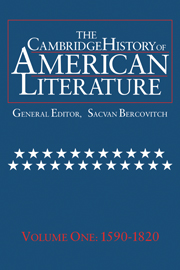BRITISH-AMERICAN BELLES LETTRES
Published online by Cambridge University Press: 28 March 2008
Summary
Belles letters has become a vague term, collecting so broad a reference that it now designates the whole of “humane letters” (litterae humaniores) – that is, all imaginative literature or all writing evincing “literariness.” Prior to the term's semantic expansion in the 1760s, it had a precise employment, naming a mode of writing that subordinated the traditional tasks of edification, revelation, and memorialization to the work of stimulating social pleasure. Belles lettres was characterized more by its effects than its forms. “Ease” and “agreeableness,” qualities adjusted to the taste of the “gentle reader,” were the primary belletristic virtues.
Edmund Waller imported the mode from France into the literary communications of the Stuart court. Belles lettres flourished in England in conjunction with the rise of urban sociability in the 1670s. New communities based on shared taste, friendship, or common interest formed in postfire London and in the burgeoning resorts. In the mixed-sex assemblies at the spas and in the male tavern clubs of the metropolis, aspirants to gentility embraced the court's new sociable manner of wit. Writing served talk in these circles, providing scripts for oral performance (club disquisitions, vers de société) and recording memorable sallies of wit (bon mots, toasts, impromptus, epigrams). Belles lettres disavowed writtenness, adopting the guise of conversation. Concomitantly, conversation assumed great weight in thought about society and letters. As the preamble to the 1728 constitution of the Harvard Philomusarian Club declared, conversation was “The Basis of Friendship, The fundamental Principle of Society, The Great Prerogative of Mankind.”
- Type
- Chapter
- Information
- The Cambridge History of American Literature , pp. 307 - 344Publisher: Cambridge University PressPrint publication year: 1994
- 2
- Cited by

